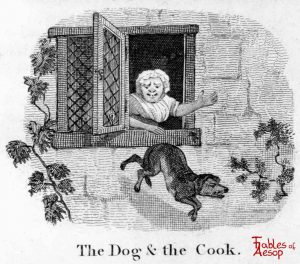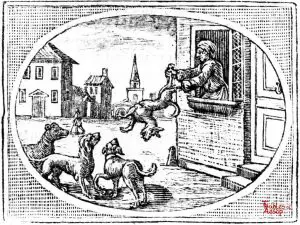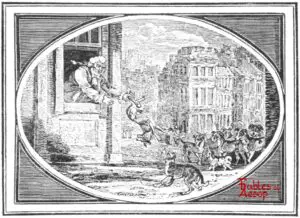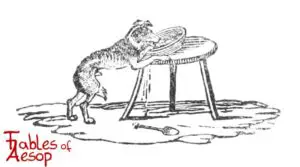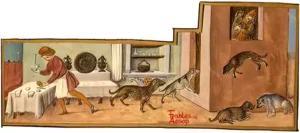A Dog invited another to the feast. The visiting Dog was found among the food by the cook who threw him out. To save face, visitor said he was drunk.
Some respect is due the servant for the sake of the master.

Townsend version
A rich man gave a great feast, to which he invited many friends and acquaintances. His Dog availed himself of the occasion to invite a stranger Dog, a friend of his, saying, “My master gives a feast, and there is always much food remaining; come and sup with me tonight.” The Dog thus invited went at the hour appointed, and seeing the preparations for so grand an entertainment, said in the joy of his heart, “How glad I am that I came! I do not often get such a chance as this. I will take care and eat enough to last me both today and tomorrow.” While he was congratulating himself and wagging his tail to convey his pleasure to his friend, the Cook saw him moving about among his dishes and, seizing him by his fore and hind paws, bundled him without ceremony out of the window. He fell with force upon the ground and limped away, howling dreadfully. His yelling soon attracted other street dogs, who came up to him and inquired how he had enjoyed his supper. He replied, “Why, to tell you the truth, I drank so much wine that I remember nothing. I do not know how I got out of the house.”

Jefferys Taylor
A GENTLEMAN (a friend of mine)
Invited sundry folks to dine;
I cannot tell you who, because
I was not there; hut some one was,
Who, when return’d, with ready pen
Recorded that which happen’d then.
It seems this circumstance occur’d;—
The dog, the orders overheard,
For game, and fish, and butcher’s meat,
And much beside,—a royal treat.
So finding mighty preparations,
The dog ask’d one of his relations;
He thought it was, and so do I,
A lucky opportunity.
This dog arriv’d, was usher’d in,
Where charming things were smelt and seen;
The meat while raw so tempting look’d,
They wish’d it were not to be cook’d;
Though then they might have thought it nice,
But for the pepper and the spice:
Yet as it might be underdone,
And some have pepper, some have none,
‘Twixt venison, mutton, beef, and veal,
They doubted not to make a meal.
But woe befel the luckless cur;
Whence some disaster, you’ll infer.
The cook, you see, who chanced to find him,
Turn’d round, and softly crept behind him,
Then took a leg in either hand,
All which you clearly understand;
And bore the inverted, howling beast
Far from the kitchen and the feast;
Then from the window to the yard
Was thrown the dog, who thought it hard.
‘Twas bad enough to break his bones,
By falling headlong on the stones;
But this, though bad, was not the worst
That yet remains to be rehearsed;
For all the dogs and cats he knew
Press’d round with friendly “how d’ye do?‘
“Do!” said our hero, somewhat gruff;
“What do you mean? I’m well enough.”
“We’re glad to hear it, sir,” said they,
“How did you like your dinner, pray?”
“Dinner!” said he,—”I only wish
All you could taste that charming dish;
In truth so much I ate and drank,
I must acknowledge, to be frank,
I was so sadly overcome,
I scarce know how I left the room.”
Thus disappointment and confusion
Reward an impudent intrusion.

JBR Collection (The Dog Invited to Supper)
A certain rich man invited a person of high rank to sup with him. Extraordinary preparations were made for the repast, and all the delicacies of the season provided. The Dog of the host, having long wished to entertain another Dog, a friend of his, thought this would be a capital time to ask him to come. As soon, therefore, as it fell dusk, the invited Dog came, and was shown by his friend into the kitchen. The preparations there filled him with astonishment, and he resolved that when the time came, he would eat enough to last him a week. He wagged his tail so hard, and licked his chaps in anticipation with so much vigour, that he attracted the notice of the head cook, who, seeing a strange Dog about, caught him up by the tail, and after giving him a swing in the air, sent him flying through the open window into the street. He limped away, and was soon surrounded by a lot of Curs to whom he had boasted of his invitation. They asked him eagerly how he had fared. “Oh, rarely,” answered he. “I went on to that extent, that I hardly knew which way I got out of the house.”

Samuel Croxall (The Dog invited to Supper)
A GENTLEMAN having invited an extraordinary friend to sup with him, ordered a handsome entertainment to be prepared. His Dog, observing this, thought with himself, that now would be a good opportunity for him to invite another Dog, a friend of his, to partake of the good cheer. Accordingly, he did so; and the strange Dog was conducted into the kitchen, where he saw mighty preparations going forward. Thought he to himself, this is rare! I shall fill my belly charmingly by and by, with some of these dainties! I’ll eat enough to last me a week: Oh, how nicely and deliciously shall I feed! While he stood and thought thus with himself, his tail wagged, and his chops watered exceedingly; and this drew the observation of the cook towards him; who, seeing a strange cur with his eyes intent upon the victuals, stole softly behind him, and taking him up by the two hind legs, threw him out of a window into the street. The hard stones gave him a very severe reception, and he was almost stunned with the fall; but recovering himself, he ran yelping and crying half the length of a street; the noise of which brought several other dogs about him; who, knowing of the invitation, began to enquire how he had fared? O, says he, admirably well; I never was better entertained in my life: but, in troth, we drank a little too hard; for my part, I was so overtaken, that 1 scarce know which way I got out of the house.
THE APPLICATION
There is no depending upon a second-hand interest: unless we know ourselves to be well with the principal, and are assured of his favour and protection, we stand but upon a slippery foundation. They are strangers to the world, who are so vain as to think they can be well with any one by proxy; they may, by this means, be cajoled, bubbled, and imposed upon, but are under great uncertainty as to gaining their point, and may probably be treated with scorn and derision in the end. Yet there are not wanting, among the several species of fops, silly people of this sort, who pride themselves in an imaginary happiness, from being in the good graces of a great man’s friend’s friend. Alas! the great men themselves are but too apt to deceive and fail in making good their promises; how then can we expect any good from those who do but promise and vow in their names! To place a confidence in such sparks, is indeed so false a reliance, that we should be ashamed to be detected in it; and, like the cur in the fable, rather own we had been well treated, than let the world see how justly we had been punished for our ridiculous credulily.

Thomas Bewick (The Dog Invited to Supper)
A Gentleman having invited several friends to supper, his Dog thought this a fit opportunity to invite another Dog, an intimate of his own, to partake with him of the good cheer, in the kitchen. Accordingly the stranger punctually attended, and seeing the mighty preparations going forward, promised himself a most delicious repast. He began to smell about, and, with his eyes intent upon the victuals, to lick his lips, and wag his tail. This drew the attention of the Cook, who stole slyly up, and seizing him by the hind legs, whirled him out of the window into the street. The Dog, stunned and hurt by his hard fall on the pavement, began to howl, the noise of which drew several Dogs about him, who knowing of the invitation, began to enquire how he had fared? O! charmingly, said he; only I ate and drank till I scarce knew which way I came out of the house.
APPLICATION.
There is no depending upon a second-hand interest; unless we know ourselves to be well with the principal, and are assured of his favour and protection, we stand upon a slippery foundation. They are strangers to the world who are so weak as to think they can be well with any one by proxy; they may by this means be cajoled, bubbled, and imposed upon, but are under great uncertainty as to gaining their point, and may probably be treated with scorn and derision in the end. Yet there are not wanting among the several species of fops, silly people of this sort, who pride themselves in an imaginary happiness, from being in the good graces of a great man’s friend’s friend. Alas! the great men themselves are but too apt to deceive and fail in making good their promises, how then can we expect any good from those who do but promise and vow in their names? To place a confidence in such sparks, is indeed so false a reliance, that we ought to be ashamed to be detected in it; and, like the Dog in the Fable, rather own we had been well treated, than let the world see how justly we had been punished for our ridiculous credulity.

L’Estrange version (A Dog Invited to Supper)
A gentleman invited a friend to supper with him, and the gentleman’s dog was so well bred as to invite the friend’s dog to come for company. The dog came at his hour, and into the kitchin he went, to see what good cheer was toward: but as he was there, wagging his tayle, and licking his lips, at the thought of what a meale he was like to make on’t, the roguy cook got slyly behind him, and spoil’d the jest. He took him up by the tayle at unawares, and after a turn or two in the air, flung him out of the window. So soon as ever the poor devil had recover’d the squelch, away he scampers, bawling like mad, with I know not how many prick-ear’d eurrs at the heels of him, to know how he lik’d his wellcome. Why truly, says he, they have given me as much drink, as my skin will hold; and it has made me so lightheaded, I could not find the right way out of the house again.
Moral
Love me, love my dog, says the old proverb, and there’s somewhat of good manners, as wed as of good nature in’t; for there are certain decencies of respect due to the servant for the master’s sake.

Gherardo Image from 1480

Canis ad Convivium Invitatus
Vir quidam cum cenam opiparam ad familiarissimum sibi amicum excipiendum appararet, eius quoque canis canem alium invitavit, “Amice,” dicens, “huc hodie mecum epulatum veni.” Ille itaque introgressus, laetus constitit magnumque convivium cernens, “Papae,” intra se aiebat, “quanta laetitia nunc perfruor. Nutriar ergo et ita ad satietatem cenabo ut omnino crastina die esurire non possim.” Dum haec secum tacitus canis volvebat caudamque agitabat, intentos gerens oculos in amicum, haud mora coquus, ubi ipsum caudam huc illuc circumagentem adspexit, pedibus arreptum extra fenestras deiecit. Canis itaque lapsus, magno cum clamore discessit. Occurrentibus proinde ceteris canibus atque rogantibus, “Ut te cena iuvit, amice?” subridens ille respondit, “Mehercle, ita mero me obrui, ut satietate iam ebrius ne viam quidem viderim qua sum egressus.”
Perry #328
